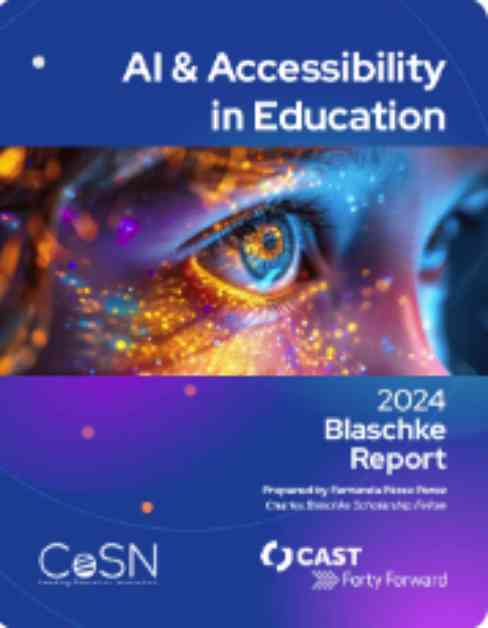CoSN and CAST recently published a detailed report called “AI and Accessibility in Education,” written by Fernanda Pérez Perez. The report discusses how artificial intelligence (AI) can improve educational accessibility and support for students, particularly those with disabilities. As AI tools like Generative AI (GenAI) and assistive technologies become more common in schools, it’s important to understand their advantages and limitations.
The report offers valuable information for educators, district leaders, and policymakers, outlining the benefits and challenges of AI in education and providing practical strategies for its effective and ethical use to enhance accessibility.
Keith Krueger, CEO of CoSN, highlighted the report’s emphasis on inclusive design and the potential of AI to create a future where every student can thrive. The report underscores the promise of AI in personalizing learning experiences for students with diverse needs, such as text-to-speech software and AI-integrated communication tools.
Case studies in the report demonstrate how AI can create individualized learning materials, aid communication for students with speech disabilities, and develop accessible math assessments for blind students. Despite its potential, AI implementation in education faces challenges like data privacy concerns and algorithmic bias.
The report stresses the importance of policy frameworks and guidelines to ensure the safe and ethical use of AI in education. Key policies include the Americans with Disabilities Act (ADA) and the Universal Design for Learning (UDL) framework, which promotes inclusive educational environments.
The report proposes a three-level solution for implementing GenAI safely, focusing on short-term actions like professional development and long-term goals of universal access to AI tools. Collaboration among educators, policymakers, and technology developers is crucial for navigating the complexities of AI effectively in education.
Fernanda Pérez Perez, recipient of The Blaschke Fellowship, expressed gratitude for the opportunity to research AI and accessibility in education, shaping her professional path. Kathy Hurley, former special education teacher, and CEO of Kathy Hurley Consulting emphasized the importance of inclusivity in education.
Lindsay Jones, CEO of CAST, highlighted the role of the UDL framework in harnessing AI’s potential to create inclusive educational environments. The full report, “AI and Accessibility in Education,” is available for download on the CoSN website.
In conclusion, the report underscores the transformative power of AI in education and the potential to create accessible and inclusive learning environments for all students. It calls for collaboration and thoughtful implementation to ensure that AI benefits students with diverse needs and backgrounds.







